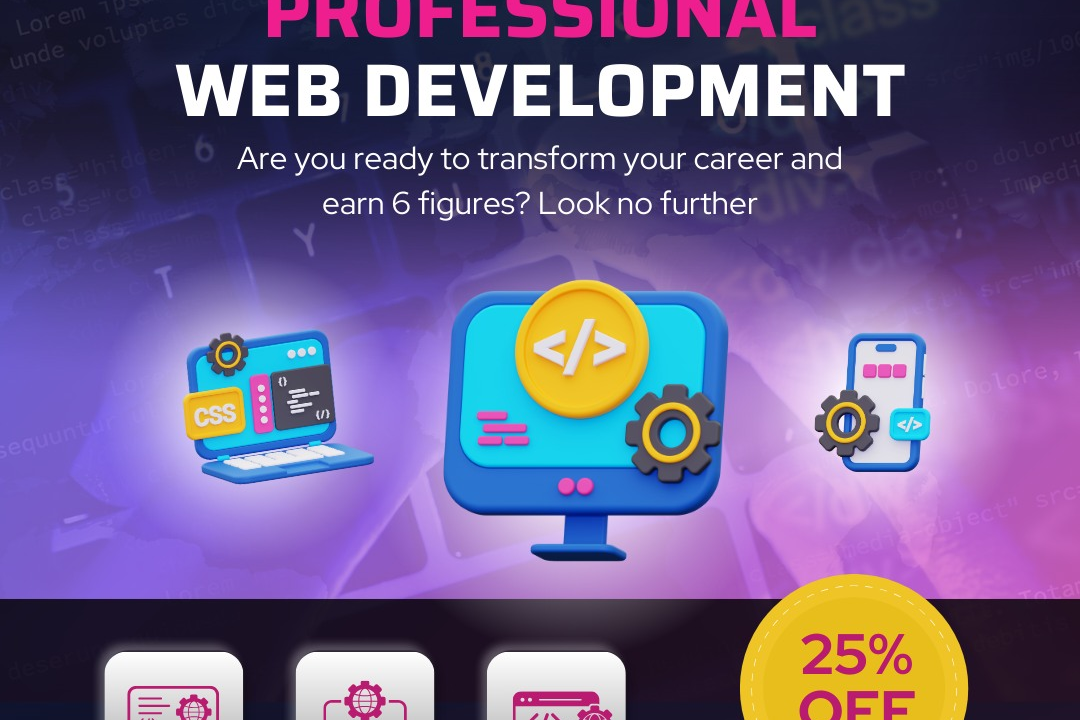Selenium Online Training Videos
Selenium online training videos offer an engaging and informative way to learn about Selenium, a wid
Selenium Online Training Videos
Selenium online training videos are a valuable resource for anyone looking to master automated testing of web applications. These videos provide comprehensive guidance on the Selenium framework, covering essential topics such as installation, writing test scripts, and implementing best practices in test automation. By utilizing real-time projects, learners gain practical experience that enhances their understanding and application of the concepts. The convenience of online access enables participants to learn at their own pace, making it easier to fit training into their busy schedules. This training not only equips individuals with in-demand skills but also enhances their career prospects in the competitive field of software testing.
To Download Our Brochure: https://www.justacademy.co/download-brochure-for-free
Message us for more information: +91 9987184296
Selenium online training videos are a valuable resource for anyone looking to master automated testing of web applications. These videos provide comprehensive guidance on the Selenium framework, covering essential topics such as installation, writing test scripts, and implementing best practices in test automation. By utilizing real time projects, learners gain practical experience that enhances their understanding and application of the concepts. The convenience of online access enables participants to learn at their own pace, making it easier to fit training into their busy schedules. This training not only equips individuals with in demand skills but also enhances their career prospects in the competitive field of software testing.
Course Overview
The “Selenium Online Training Videos” course offers a comprehensive introduction to the Selenium framework, focusing on automated web application testing. Participants will explore key concepts such as installation, configuration, and scripting in Selenium, supplemented by real-time projects that provide hands-on experience. The course content is designed to cater to varying skill levels, allowing beginners to grasp foundational concepts while also presenting advanced techniques for experienced testers. By the end of the course, learners will be equipped with the practical knowledge and skills necessary to effectively implement test automation, enhancing their proficiency and career potential in the software testing domain.
Course Description
The “Selenium Online Training Videos” course provides an in-depth exploration of the Selenium framework, designed to empower learners with essential skills for automated web application testing. This course covers a wide range of topics, including environment setup, scripting fundamentals, and advanced testing techniques, all delivered through engaging video tutorials. Participants will gain hands-on experience by working on real-time projects, enabling them to apply theoretical knowledge in practical scenarios. Ideal for both beginners and experienced testers, this course equips learners with the tools and insights required to excel in the field of test automation and improve their career prospects.
Key Features
1 - Comprehensive Tool Coverage: Provides hands-on training with a range of industry-standard testing tools, including Selenium, JIRA, LoadRunner, and TestRail.
2) Practical Exercises: Features real-world exercises and case studies to apply tools in various testing scenarios.
3) Interactive Learning: Includes interactive sessions with industry experts for personalized feedback and guidance.
4) Detailed Tutorials: Offers extensive tutorials and documentation on tool functionalities and best practices.
5) Advanced Techniques: Covers both fundamental and advanced techniques for using testing tools effectively.
6) Data Visualization: Integrates tools for visualizing test metrics and results, enhancing data interpretation and decision-making.
7) Tool Integration: Teaches how to integrate testing tools into the software development lifecycle for streamlined workflows.
8) Project-Based Learning: Focuses on project-based learning to build practical skills and create a portfolio of completed tasks.
9) Career Support: Provides resources and support for applying learned skills to real-world job scenarios, including resume building and interview preparation.
10) Up-to-Date Content: Ensures that course materials reflect the latest industry standards and tool updates.
Benefits of taking our course
Functional Tools
1 - Selenium WebDriver: The core tool used in Selenium Online Training Videos is Selenium WebDriver, which allows testers to automate web applications across multiple browsers and platforms. WebDriver provides a collection of APIs that enable interaction with web elements seamlessly. Students learn how to write scripts in various programming languages such as Java, Python, C#, and Ruby, enhancing their flexibility in choosing the programming language that suits their projects.
2) Selenium IDE: Selenium Integrated Development Environment (IDE) is a tool designed for creating and executing tests in a rapid and user friendly manner. During the training, students will familiarize themselves with the record and playback features of Selenium IDE, enabling them to build test cases without extensive coding knowledge. This is particularly beneficial for beginners who want to grasp the basics of automated testing through an intuitive interface.
3) TestNG: TestNG is a testing framework inspired by JUnit, designed to cover all categories of tests: unit, functional, end to end, and integration. The Selenium Online Training Videos incorporate TestNG to illustrate how to structure tests, manage test suites, and generate reports effectively. By the end of the training, students will understand how to leverage TestNG’s capabilities, such as parallel execution and data driven testing, making their testing process more efficient.
4) Apache Maven: Maven is a build automation tool commonly used in Java projects, and it simplifies project management. In the course, students learn to implement Maven to manage dependencies, build projects, and streamline the testing process. Understanding Maven is crucial for organizing code, facilitating smoother development cycles, and enhancing collaboration in team environments where versions and dependencies need to be properly managed.
5) JUnit: JUnit is another widely used testing framework, particularly within the Java programming ecosystem. The training emphasizes the use of JUnit for designing and executing test cases alongside Selenium WebDriver. Students will learn about annotations, assertions, and test case management within JUnit, which are vital components for ensuring the quality and reliability of software applications.
6) Selenium Grid: Selenium Grid is a tool that allows for distributed testing across multiple machines and browser combinations simultaneously. The training program introduces students to the grid setup, enabling them to run tests concurrently on different platforms and browsers. This functionality significantly reduces test execution time and highlights the importance of scalability in automated testing, preparing students for real world testing environments where efficiency is paramount.
7) Page Object Model (POM): The Page Object Model is a design pattern that enhances test maintenance and reduces code duplication. During the training, students will learn how to implement POM by creating separate classes for each web page of the application, encapsulating the page functionalities, and providing a clear interface for test scripts. This approach promotes a more organized test structure, making it easier to update tests when changes occur in the application’s user interface.
8) Cross Browser Testing: The training emphasizes the importance of cross browser testing to ensure that web applications function correctly across multiple browsers and devices. Students will learn how to utilize Selenium's capabilities to perform cross browser tests seamlessly, identifying browser compatibility issues and ensuring a consistent user experience. Understanding cross browser testing is essential in today’s diverse digital landscape.
9) Continuous Integration (CI): Integration of Selenium tests within CI/CD pipelines is a crucial topic covered in the training. Students will explore various CI tools like Jenkins, Travis CI, and CircleCI, learning how to automate the execution of Selenium tests in conjunction with software builds. This practice fosters a culture of rapid development and immediate feedback, which is essential for agile methodologies.
10) Handling Dynamic Web Elements: Many modern web applications feature dynamic content that changes in response to user interactions. The training includes techniques for handling dynamic web elements like AJAX calls, loading indicators, and changing IDs. Students will learn how to effectively use waits (implicit and explicit waits) to ensure that their tests interact with elements smoothly, minimizing flakiness and enhancing test reliability.
11 - Test Automation Strategies: The course structure provides insights into formulating effective test automation strategies tailored to specific projects. Students will assess when to implement automation versus manual testing and how to prioritize test cases for automation. Understanding the strategic aspects of test automation helps organizations maximize their ROI on testing efforts.
12) Debugging and Troubleshooting: Students will also gain hands on experience in debugging and troubleshooting their Selenium scripts. The training covers common pitfalls and errors encountered during test automation, empowering students to identify issues quickly and implement effective solutions. This skill is crucial for maintaining the robustness of automated tests.
13) Performance Testing Basics: While the primary focus is on functional testing, an overview of performance testing concepts may also be included. Students will learn about integrating Selenium with tools like JMeter or LoadRunner, gaining a foundational understanding of how to assess web application performance alongside functional testing procedures.
14) Best Practices in Test Automation: The training concludes with a discussion on best practices and industry standards for automated testing. Topics may include writing readable and maintainable code, incorporating version control with Git, and adhering to coding conventions. Students will come away with a solid foundation in creating efficient, reliable, and sustainable automated test suites.
15) Real World Projects: Throughout the training, participants engage in real time projects that simulate actual testing scenarios. This hands on experience is invaluable, allowing students to apply theoretical knowledge to practical problems, build a portfolio of work, and prepare for challenges they may face in their professional lives.
16) Certification Preparation: As part of JustAcademy’s commitment to professional development, this training prepares students for certification exams in Selenium and test automation, equipping them with the knowledge and skills necessary to validate their expertise and enhance their career opportunities in the tech industry.
By incorporating these expanded points, the training program at JustAcademy ensures that students receive a comprehensive education that addresses the multifaceted nature of test automation with Selenium.
Browse our course links : https://www.justacademy.co/all-courses
To Join our FREE DEMO Session:
This information is sourced from JustAcademy
Contact Info:
Roshan Chaturvedi
Message us on Whatsapp:
Email id: info@justacademy.co
Buliding Android App With Flutter Is Best Or Android Studio












